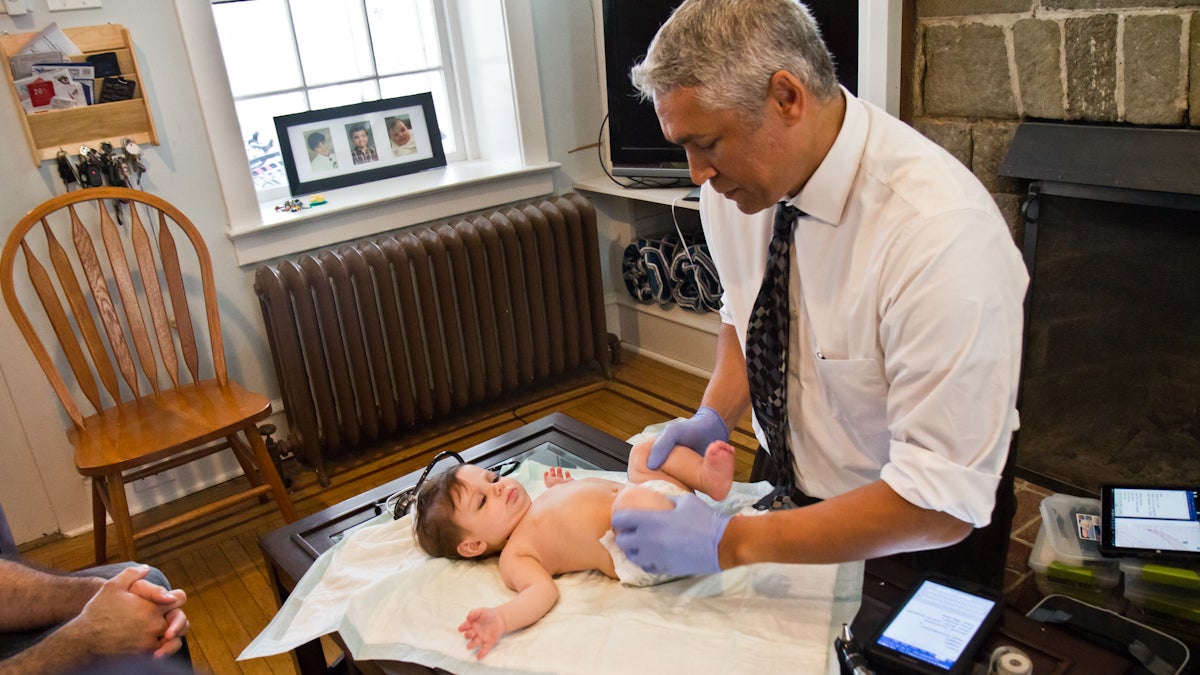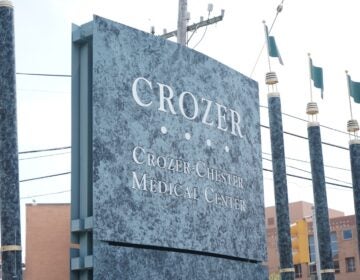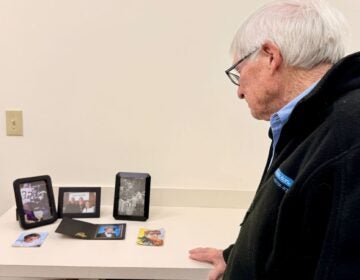Health experts work hard to counter anti-vaccine activism
Listen
Pediatrician Andrew Wood vaccinates 6-month-old Maysa Abboud at a recent home visit. (Kimberly Paynter/WHYY)
One of the first, big decisions parents have to make is whether or not to vaccinate their child.
Vaccines are vital to public — and individual — health. Plus, an abundance of scientific evidence shows vaccines are safe. Yet many families choose not to follow the recommended childhood vaccination schedule. Some of those parents and their children gathered in Washington, D.C., last month for a rally. The activists said the media has become a pro-vaccine government propaganda tool.
Despite exhaustive science that has found that vaccines are safe, many in the crowd said they believe vaccines are hurting people. They met with Congressional representatives and demonstrated in front of the White House.
Pediatrician Paul Offit has been speaking about the value of vaccines for decades. He leads the Vaccine Education Center at the Children’s Hospital of Philadelphia.
He’s outspoken and, as a result, deals with lots of blowback.
“It’s the rare week that goes by without me getting some form of hate mail,” Offit said.
“The hate mail usually takes the themes of Nazis and satans and, you know, going to hell and, you know, ‘Watch your back’ — that sort of thing.”
He’s been sued several times. Other people have tried to intimidate him.
“I got a phone call from a man who seemed reasonable enough,” Offit said.”He said, ‘Look, we all want what’s best for our children. I want what’s best for my child,’ stating his name and age and ‘You want what’s best for your children.’ Then he said the names of my children, he said the ages of my children, and then he said where they went to school, and then he hung up.”
After that call, Offit considered stepping back. But in the end he kept up his work to protect children’s health.
Offit says it’s perfectly reasonable to be a “vaccine skeptic”: to ask questions about safety. But he says some people are not ‘skeptics,’ they’re actually ‘cynics.’
“They don’t believe the data. They think there’s just a massive conspiracy to hide the truth and therefore they shouldn’t get vaccines no matter what the evidence shows,” Offit said.
Doctors find themselves talking a lot about vaccines, and the research that shows that immunizations are safe.
Philadelphia Pediatrician Andrew Wood spends lots of his time discussing vaccines with parents and reassuring them about safety.
Wood makes home visits, and childhood immunizations are part of the routine care he provides.
On a recent afternoon, as 6-month-old Maysa lay smiling on a coffee table in the middle of her family’s living room, Wood prepped his supplies to give her a Hib shot to protect against Haemophilus influenza type B and a Streptococcus pneumoniae shot.
When the doctor poked Maysa’s chubby leg, the usually giggly baby broke into sobbing cries. It’s a slightly uncomfortable but familiar sound for parents who choose to vaccinate their children.
For Maysa’s father, Samer Abboud, the vaccination reminds him of a different pain, experienced by his father.
“My father had polio when he was a kid, and he comes from a community where many people had polio,” Abboud said. “So he had cousins who had polio; my mother had cousins who had polio. It was actually something that was very common in the village that they grew up in, in Lebanon.”
Abboud says seeing his father’s health deteriorate has reinforced his own support for vaccination.
Maysa’s mom, and Abboud’s wife, Sonia Rosen — whose family is from Morocco — said she feels similarly about vaccines: Having them available is a privilege.
“The idea that like we could even consider not having a vaccine. Whereas in most of the world, when people have access to vaccines, it’s like deeply desired, you know, because it can prevent stuff that kills people very easily,” she said.
Pediatrician Andrew Wood says he enjoys these home visits, in fact he no longer has a traditional doctor’s office.
He said that change allows him to spend more time with his patients. He’s able to forge personal connections and answer questions for parents in the comfort of home.
Wood says he wants never to pressure parents into doing something that makes them uncomfortable, “but to give them my opinion, my expert opinion, and educate them as much as possible about the vaccines. And then let them make informed decisions.”
Wood said, “Right after ‘Do no harm,’ I feel like informed consent is really probably the most important thing in terms of the values of medicine.”
About 5 percent of Wood’s patients don’t receive their immunizations according to the American Academy of Pediatrics schedule — and that includes children whose parent refuse vaccination completely.
But, Wood says, even most of those children end up getting all the recommended shots by kindergarten.
Paul Offit, from the Children’s Hospital of Philadelphia, said he wishes more pediatricians would draw a harder line when discussing immunizations with parents.
“Pediatricians, especially young pediatricians, are going to have to go against their training. I mean their training is to sort of be open-minded to all sorts of attitudes and beliefs and cultural differences — which is good up to a point,” Offit said. “But this is that point. I mean, know that when you send a child out of your office unvaccinated or undervaccinated that there’s a lot of diseases out there that they could get and be harmed by or killed by.”
As a child, Offit, who’s in his 60s now, had measles, mumps, and chickenpox. In a way, he says vaccines are a victim of their own success.
“Think about it for a second. In the United States we ask parents to give — in the first few years of life — vaccines that prevent 14 different diseases,” Offit said. “Which can mean as many as 26 innoculations during that period of time. It can mean as many as five shots at one time to prevent diseases most people don’t see, usually biological fluids most people don’t understand.”
In the United States these days, it’s rare to experience the 104-degree fever and red, blotchy skin rash that accompany the potentially deadly virus called measles, or the gasping for air and vomiting that come with the bacterial infection known as whooping cough, or pertussis. As vaccine usage has dipped in some places, both measles and pertussis cases have again begun popping up. In Europe, measles’ highly contagious nature has lead to outbreaks, including in Romania, where at least 17 unvaccinated children have died from the disease. Still, the fact that most people have not directly experienced these diseases, and don’t understand the science behind vaccines, has proven to be fertile ground for misinformation.
The flawed work of British health researcher Andrew Wakefield still reverberates in public discourse. His 1998 study claimed to have found a link between autism and the MMR vaccine, which protects children against measles, mumps, and rubella. The work was debunked and has since been disproven. Seventeen studies have shown that the MMR vaccine does not cause autism.
The modern anti-vaccine movement was likely born long before Wakefield’s infamous study. Many pinpoint the beginning to April 1982, when an NBC TV station in Washington, D.C., aired a special called “Vaccine Roulette.” The program made inaccurate claims about the vaccine against whooping cough.
The TV program was criticized for a lack of hard science to back its sweeping claims, including the allegation that the “medical establishment” aggressively promoted the pertussis vaccine, but turned its back on parents’ claims that their children were injured by the vaccine.
As Seth Mnookin, author of “The Panic Virus,” writes:
“The report, hosted by Lea Thompson, was an example of scare-mongering at its worst: Throughout the hour-long show, Thompson featured heart-breaking interviews with parents who described how their children had been left in near-comatose states after receiving a vaccine that was mandatory for public-school children in the vast majority of states. These were augmented by what turned out to be inaccurate statistics, cherry-picked quotes, and risible falsehoods about some of the ‘experts’ Thompson used to support her thesis that the ‘medical establishment’ was “aggressively promot[ing]’ a vaccine while willfully ignoring ‘the consequences.'”
In the days after “Vaccine Roulette” aired, the TV station gave callers the phone numbers of other worried people who’d already called with concerns about vaccines. Worried parents were put in touch with other worried parents. The modern-day anti-vaccine movement was born. The movement has spread with the help of the internet and celebrities like Jenny McCarthy and Robert Di Niro. Both are parents of children diagnosed with autism.
Back when Paul Offit started working on vaccines in 1980 he didn’t envision himself becoming a defender of vaccines, but he says he’ll never stop speaking up.
“We see at least one child in this hospital every year who suffers and occasionally dies from a vaccine-preventable disease, invariably because the parents made a choice not to vaccinate them. It’s just a dangerous game to play,” he said.
WHYY is your source for fact-based, in-depth journalism and information. As a nonprofit organization, we rely on financial support from readers like you. Please give today.






